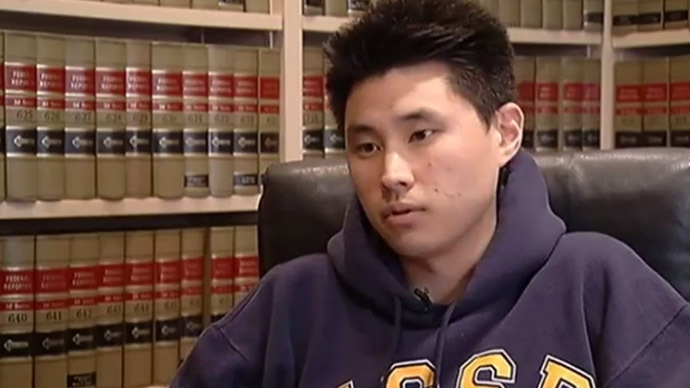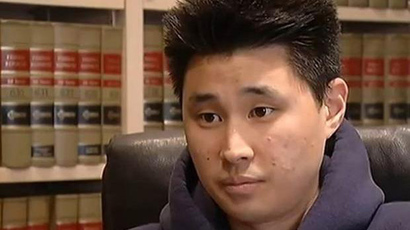DEA assigned agents who left student for dead in cell to investigate themselves

An internal Department of Justice watchdog has criticized the US Drug Enforcement Administration for allowing agents that left a college student in a holding cell for an excruciating five days without food or water to then investigate the incident.
The Office of the Inspector General (OIG) released on Tuesday a summary of its investigation into the arrest of University of California-San Diego student Daniel Chong, who resorted to drinking his urine and, believing he would not survive, attempted to scrawl a farewell message in blood on his cell wall. According to Chong's lawyers, he reached a $4.1 million settlement with the Drug Enforcement Administration (DEA) last year.
The OIG said it was a conflict of interest for the supervisor of the DEA’s San Diego Field Division to call on the same case agents responsible for Chong’s prolonged detention to head the investigation into how and why Chong was abandoned without sustenance or access to a toilet.
The report added that DEA officials at its San Diego headquarters and in the field "improperly initiated a review of the incident" before they notified the OIG, a violation of the Department of Justice and DEA policy, which "could have caused harm to a potential criminal prosecution."
Chong was 23 when he was arrested in April 2012 during a raid at a friend’s home where the DEA said it confiscated ecstasy, marijuana, hallucinogenic mushrooms, and weapons.
Officers quickly determined Chong was not part of a drug trafficking circle and placed him in a windowless holding area, saying he would be released soon. Yet he spent the next five days handcuffed in the 5 by 10 ft. cell with no attention given to him despite his best efforts.
“I didn’t just sit there quietly. I was kicking the door yelling,” Chong said last year at a news conference where he spoke about the near-death experience.
Deprived of food and water in the DEA cell, he started to accept the idea that he would not survive. He bit into his glasses to break them, and used a shard of glass to carve a farewell message to his mom on his arm.
“Sorry Mom,” he tried to carve into his bleeding skin, but he only managed to write the “S”.
In a last-ditch attempt to stay alive, he urinated on the metal bench in his cell and then drank his own urine.
To try to capture the attention of the guards, he then stacked a blanket and his clothing on the bench to try to reach an overhead fire sprinkler. Chong desperately tried to set it off by hitting it with his handcuffed hands. He failed.
He slid a shoelace under the door, hoping to garner the attention of the guards. He succeeded, and “five or six people” came to the cell and found him starved and lying in his own feces. Chong had lost 15 pounds, and was immediately hospitalized for five days to address dehydration, kidney failure, a perforated esophagus, and cramps,
“I had to do what I had to do to survive,” Chong told NBC7 about the incident.“It’s so inconceivable. You keep doubting they would forget you.”
The summary of the OIG report identified four DEA employees who saw or heard Chong during his dismal stretch in the holding cell. Despite the dire conditions of his detention, “the employees told us there was nothing unusual about their encounters with Chong," the summary said.
Despite its damning findings, the investigation found that the decision to decline prosecution in the case was reasonable in light of all the facts and circumstances. It is not known if any disciplinary action was taken against the unnamed officers and DEA officials involved.
The OIG says it was only notified of the incident when tipped off by an anonymous caller, then later by members of the public.
The full version of the OIG report has yet to be released. The summary was offered "in the interest of enhancing transparency in administrative matters, consistent with privacy considerations,” the OIG said.
Chong’s lawyer during his settlement with the agency said the OIG summary "highlights the unacceptable and appalling failings of DEA, both systemic and individual."
"We are gratified by the thorough and impartial investigation by the OIG [Office of the Inspector General] and pleased that what happened to Daniel will serve as an impetus for critical institutional changes," Julia Yoo told The Huffington Post. "I would urge the OIG to release the entire investigation report for the sake of transparency."
The DEA’s San Diego office said in a statement that it was still troubled by Chong’s treatment and that the agency implemented new procedures for monitoring its facilities.
"The Drug Enforcement Administration remains deeply troubled by the unfortunate incident surrounding Daniel Chong's detention at DEA's San Diego Division in April 2012," the DEA’s Amy Roderick said.
"Immediately following the incident, DEA implemented a new agency wide policy for processing arrestees and detainees. These procedures closely mirror the OIG's recent recommendations, and include routinely inspecting holding cells, assigning an agent or task force officer to the holding area, and maintaining an occupancy ledger for holding cells. The DEA is confident that these measures will help to prevent similar incidents in the future."
The Chong case "remains an ongoing internal disciplinary matter and we cannot comment any further,” the DEA said.













